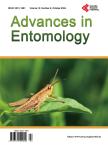Management of the Prickly Pear Mealy Bug, Dactylopius opuntiae Using Bio-Insecticide in Morocco
Management of the Prickly Pear Mealy Bug, Dactylopius opuntiae Using Bio-Insecticide in Morocco作者机构:Laboratory of Biotechnology and Natural Resources Valorization Faculty of Applied Sciences Ibn Zohr University Agadir Morocco Laboratory of Biotechnology and Natural Resources Valorization Faculty of Sciences Ibn Zohr University Agadir Morocco
出 版 物:《Advances in Entomology》 (昆虫学(英文))
年 卷 期:2022年第10卷第4期
页 面:267-274页
学科分类:1008[医学-中药学(可授医学、理学学位)] 1006[医学-中西医结合] 100602[医学-中西医结合临床] 10[医学]
主 题:Cochineal Control Bio-Insecticidal Nopal Beet Eucalyptus Opuntia
摘 要:The cochineal, Dactylopius opuntiae, has recently become the main pest that damages the prickly cactus, Opuntia ficus-indica, plants in Morocco. The control methods in which pesticides are used and applied weekly, have generated phytotoxicity, poisoning and high residuality in fresh nopal, which also prevents its commercialization in international markets and the constant risk to human and animal health. Therefore, the use of less aggressive products with a low impact on the environment and is sustainable for the crop, has been introduced without an obvious strategy for gradual control of the insect. This study was conducted to evaluate the effects of Beta vulgaris subsp., Eucalyptus torquata and Cedrus atlantica plant extracts (Eucalyptus leaves, small pieces of beet and Cedrus leaves powdered and macerated in 100 ml of distilled water for 72 h) for controlling of D. opuntiae under laboratory and field conditions. The results show that these extracts constitute a viable alternative for the control of wild cochineal in the nopal. A gradual reduction of cochineal populations was obtained, until after the third application with these extracts, with biological effectiveness of up to 90%. The findings of our study indicate that Beta vulgaris subsp., plant extracts could be used in the development and implementation of a biological control program against D. opuntiae under field conditions.



